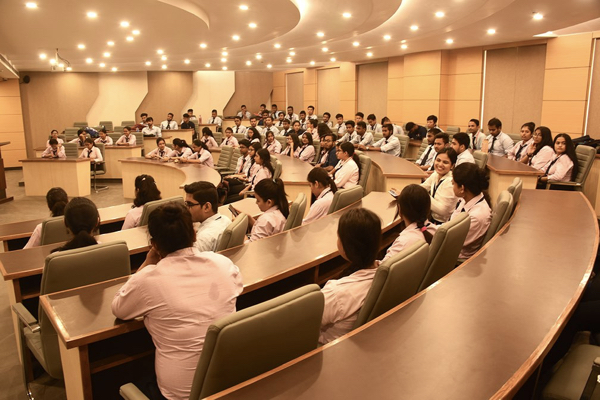ADMISSION HELPLINE


Royal Global University’s (RGU) approach towards formal education is learner-centric and as such the University has adopted Choice Based Credit System (CBCS) to allow flexibility in the education system, so that students depending upon their interests, learning needs and aptitude can choose inter-disciplinary, intra-disciplinary and skill- based courses along with emphasis on enhancing students’ ability in Communication Skills and Behavioral Approach. CBCS makes education broad- based and at par with global standards, which is the need of the hour. The motive of a holistic education is to infuse ethical values and morals in an individual’s consciousness along with cultivating intellectual minds to bring a positive change in society at large.
Core courses are those, the knowledge of which are deemed essential for students registered for the program. A student has to compulsorily take these subjects. The subjects designed under this category aim to cover the knowledge that a student is expected to imbibe in that particular discipline, along with compulsory summer internships, projects, dissertation, field study/clinical exposure etc.. For example, the core course for a student pursuing MBA in Human Resource and Marketing in Royal Global University will comprise subjects related to his/her specializations along with the compulsory foundation courses of MBA.
Similarly, a student who pursues BA (H) in Psychology at Royal Global University, all subjects related to Psychology along with other foundation courses, will be considered as core subjects.
Generic Electives are those subjects which are to be opted by students of any department offered by other schools/departments of the university. Generic Electives are offered only to undergraduate students. A student has to opt and study for 2(two) GE courses from 1st to 4th semester comprising a total of 24 credits.
For example, a student of B.A. Political Science (H) can choose one course from Economics and another from Fine Arts. A basket of courses is available to students from all the schools of the University.
As specified in the CBCS system and suggested by UGC any student wishing to earn extra credits, over and above the normal credits, can additionally opt for 2 GE courses in the last 2 semesters and this will also be reflected in their transcripts.
These are compulsory courses related to a program opted by a student aimed to enhance students’ in depth subject knowledge and can be chosen from a basket of many subjects offered by the department. The DSE subjects for UG courses are offered in the last two semesters while PG students have to choose 1 to 3 courses in every semester depending upon the courses offered in the program.
For example, a B.Sc (H) Chemistry student can opt for subjects on Organic or Inorganic or Physical Chemistry or any other subject offered by the Department of Chemistry.
Example: A student of BBA first semester, apart from his regular core courses, will also require taking up the following AECC courses:
To enhance competitive skills, a student must opt for two AEEC/SEC courses of 2 credits offered by any school. For example, a student of B.Sc (H) in Mathematics or M.Sc Mathematics may opt for subjects like:
Each academic year (July to June) shall comprise two semesters viz. Odd and Even semesters. Odd semesters shall be from July to December and Even Semesters shall be from January to June. There shall not be less than 90 working days in each semester (exclusive of the Semester End Examination days.) Longer contact hours in a semester calendar provide more space for better quality of instruction. Moreover, the extra time also allows for greater collaboration with not only peers but with teachers and mentors too.
We all need helping hands to steer us in the right direction. That’s where the RGU Mentor-Mentee program plays a pivotal role. Royal Global University (RGU) recognizes the practicality where mentoring can play an important role in the all- round development of its students. The aim of this Mentor-Mentee program is to provide a welcoming and supportive environment to the students at RGU. The University’s Mentor-Mentee program aims to match small group of students (the Mentees) with a student (the Mentor) as well as a Faculty Mentor and a Faculty Core Committee, to share knowledge and experience. Through this program, the mentors get feedback and networking opportunities wherein the mentees obtain advice, support, guidance and wide bases for skills, knowledge and networking opportunities.
Royal Global University follows Relative Grading System wherein, a student’s performance is assessed in comparison to others in the class. The point values are not directly assigned to a letter grade. It builds competitiveness among students to stand out in relation to others. However, Relative Grading in RGU shall be applicable only when the students’ strength in a class is more than 30; otherwise, for class strength up to 30 Absolute Grading System is followed.
The evaluation system of a paper for a course running under Royal Global University is divided as per the following:
| Sl. No. | Particulars | Weightag |
|---|---|---|
| 1 | Continuous Evaluation | 30% |
| 2 | Semester End Examination | 70% |
| 3 | Total | 100% |
1. The Continuous Evaluation component is again re-divided as per the following connotation:
Class Participation (15%)
Every student’s progress and performance are continuously adjudged throughout the semester in different ways such as Class Tests, Viva, Assignments, Project Work, and Seminars etc. 15% marks are allotted under the head ‘Class Participation’
Mid-Term Examination (10%)
This is a written test conducted in the middle of the semester after completion of 30% to 40% of the course. 10% marks are allotted for Mid-Term Examination.
Attendance (5%)
Ideally, a student is expected to attend 100% of the classes, but considering various hindrances like illness, accident, etc. a relaxation of maximum 25% is given, which means a student has to maintain an attendance of minimum 75% in each subject. 1-5 marks are given to students having more than 75% attendance. Attendance is awarded to a student as per the following connotation.
| Percentage of Attendance (%) | Marks |
|---|---|
| More than 95% | 5 |
| More than 90% and up to 95% | 4 |
| More than 85% and up to 90% | 3 |
| More than 80% and up to 85% | 2 |
| More than 75% and up to 80% | 1 |
| Up to 75% | 0 |
2. The Semester End Examination (SEE) carries a weightage of 70% and is conducted usually on May-June and December-January for Odd and Even Semester respectively for all papers of a particular course. Based on prescribed course structure, the nature of examination may vary for theoretical and practical papers.